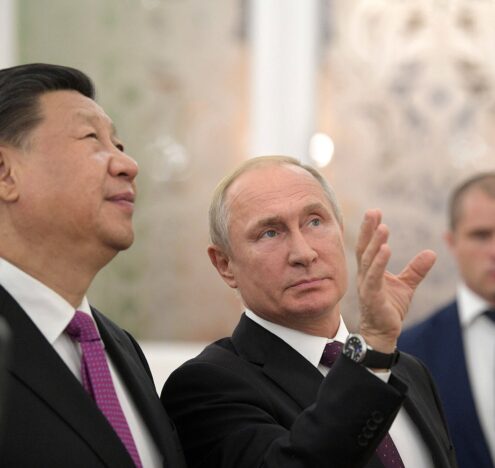Thursday, Sept. 26 is the International Day for the Total Elimination of Nuclear Weapons. On this day, Congressman Jim McGovern is inviting every member of Congress who is concerned about the rising danger of nuclear war to join him in speaking during the first Democratic hour after legislative business for a one-hour Special Order on the need for the United States to reduce the rising risks of nuclear war and reaffirm the goal of a world free of nuclear weapons.
Some will focus on dollars, rightly criticizing those in Congress who suggest we build up the already massive US nuclear arsenal by spending hundreds of billions of additional tax dollars on top of the already bloated budget of $756 billion on nuclear weapons over the next 10 years and $1.5 trillion over the next three decades.
Yet, it’s also an opportunity for members of Congress to go deeper by speaking honestly about a topic that only the most visionary of US leaders have had the courage to address: the failings of nuclear deterrence as a security strategy. It is time for members of Congress to ask some hard questions about whether or not nuclear deterrence is a sustainable policy.
The Failures of Nuclear Deterrence
The theory of nuclear deterrence has become a form of deeply embedded idolatry at a time when it should be thoroughly interrogated. US Strategic Command insists publicly that “Every capability in the Department of Defense is underpinned by the fact that strategic deterrence will hold.” Until the fall of 2022, this promise was pinned on STRATCOM’s public Twitter feed, then taken down.
But to a private audience at Sandia National Laboratories later that same year, STRATCOM deputy director Lieutenant General Thomas Bussiere admitted that the assurance that deterrence will never fail is not true: “Everything unravels itself if those things are not true.”
That unraveling has occurred. The world has come very close to nuclear war on multiple occasions. Usually because of sensor error or a failure of intelligence, both Washington and Moscow have at various times been convinced they were under attack and began the process of launching nuclear weapons in response. On those occasions, nuclear deterrence failed.
Decisions were made to launch nuclear weapons. The theory of nuclear deterrence asks us to believe that this scenario could never happen, yet it has on multiple occasions. At the last minute, Washington and Moscow called off the nuclear launches when they learned that they had received faulty information.
Responsible Leadership
Responsible leaders do not ignore this documented history of near civilization-ending nuclear accidents, miscalculations, and technical errors. This is the failure of nuclear deterrence and the success of good luck.
As former Secretary of Defense Robert McNamara famously declared after the Cuban Missile Crisis, “We lucked out. It was luck that prevented nuclear war.” The policies of the nuclear weapons states are a hope that this luck will continue. But hoping for good luck is not an acceptable security policy and, eventually, our luck will run out.
The story of nuclear weapons will have an ending: it will either be the end of nuclear weapons or the end of human civilization.
This is the Faustian bargain of nuclear deterrence. Unfortunately, every technology eventually fails. Every human being fails sometimes. When the technology is nuclear weapons, failure could mean the end of human civilization. The story of nuclear weapons will have an ending: it will either be the end of nuclear weapons or the end of human civilization.
As a corrective to the dogmatic adherence to nuclear deterrence, members of Congress should thoroughly interrogate the failures of nuclear deterrence and demonstrate leadership on this issue, making it clear that they would support bold action by the president toward achieving a world free of nuclear weapons. They should also support actions to ensure that the unacceptable risk of nuclear deterrence failures informs every capability decision of the Department of Defense.
Disarmament Diplomacy
We have been lucky enough to avoid a catastrophic failure of nuclear deterrence for more than 70 years, but that record understates how close we came to causing our own destruction.
Several near-disastrous incidents have occurred. This documented history motivated several US presidents including Ronald Reagan, John F. Kennedy, Dwight D. Eisenhower, Jimmy Carter, George H.W. Bush, and Barack Obama to back away from the brink of nuclear armageddon and support new treaties and unilateral actions to reduce the number of nuclear weapons and the risk of nuclear war.
Having recognized that nuclear weapons could end civilization, they felt a heavy moral and ethical responsibility to negotiate significant safety measures and employ disarmament diplomacy to achieve a serious reduction in the number of nuclear weapons. These leaders demonstrated the political courage and vision to steer the future security of humanity toward a world without doomsday weapons that risk ending human civilization. Once they realized that nuclear war was madness, they had no choice but to chart a path to a safer future.
Unfortunately, too many today shrug their shoulders and say the time for negotiations is not now. This begs the question — why not try? We should ask ourselves why we are so quick to authorize almost $2 trillion in new nuclear weapons in the idealistic hope that deterrence will not catastrophically fail over the next 50 years while we are not willing to spend even 1% of that budget on disarmament diplomacy and risk reduction efforts.
New START at Risk
In 2023, the Biden administration offered to discuss, “without preconditions,” a new nuclear arms control framework with Russia, and separate bilateral nuclear risk reduction talks with China.
Russian President Vladimir Putin has, so far, refused to accept President Biden’s offer. Recently, China’s leaders have also rejected US offers for follow-up talks on nuclear risk reduction and arms control issues, citing ongoing US arms sales to Taiwan.
Still, giving up would be unwise. The US should extend and strengthen the president’s offer. History teaches us that persistent diplomacy has yielded remarkable achievements.
For example, on Aug. 6, 1985, Soviet leader Mikhail Gorbachev had declared a nuclear test moratorium. Despite a lack of reciprocation from the Reagan administration, the Soviet moratorium had a substantial impact on Western public opinion, and Gorbachev extended it through 1986.
In October 1991, just before the disintegration of the Soviet Union, Gorbachev announced another year-long testing moratorium. His successor, President Boris Yeltsin, confirmed the extension of the moratorium and called again for the US to reciprocate. In response, Democratic and Republican members of Congress introduced legislation to halt US nuclear testing for one year, which gained momentum and received approval in October 1992.
Heeding this important lesson from history, the president should double down on commonsense efforts to use diplomacy to cap and reduce the Russian and Chinese nuclear arsenals. Before New START expires in 2026, the president, with support from Congress, should strengthen its offer to negotiate bilaterally with Russia and China by proposing the start of a series of nuclear disarmament dialogues involving all nine nuclear-armed states leading to negotiations for the elimination of all nuclear weapons globally.





















